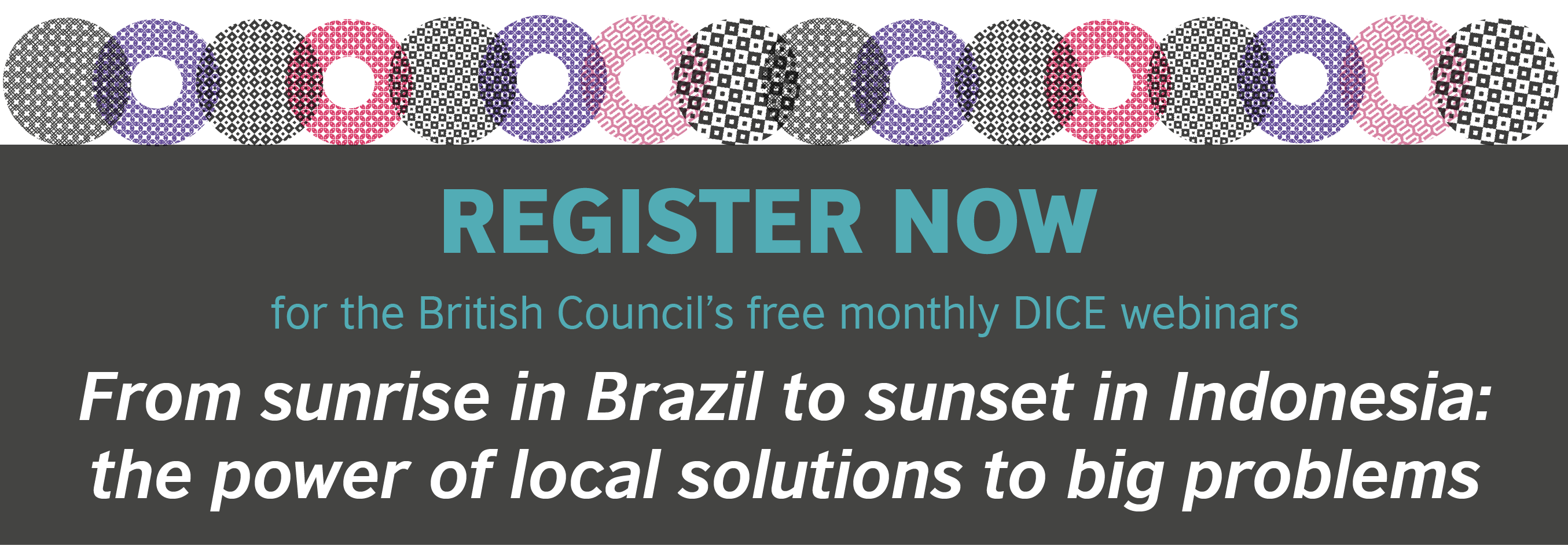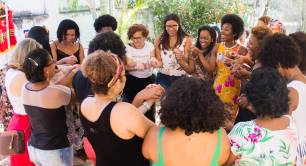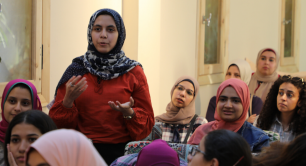The beauty of an unexpected email leads to UK-Brazil collaboration for artists and entrepreneurs
An innovative incubator for young artists and entrepreneurs from excluded communities in Brazil not only develops their business skills but also works on insecurity and low self-esteem.

Sometimes a message from a stranger arrives unexpectedly and with almost perfect timing. That’s the story of an email received by Catherine Rogers, director of Haarlem Artspace, a start-up community arts centre in a converted metal workshop in the UK’s Derbyshire. The message was sent by Georgia Nicolau from halfway across the world – from the port city of Santos in Brazil.
Georgia is one of the founders of Instituto Procomum, another arts-based non-profit active in an area known as the Baixada Santista. She was interested in forming a partnership to bid for financial support for a project from the British Council’s DICE Fund. Searching through a list of people that were involved in DICE Fund events she came across Catherine’s profile, read one of her blog posts on building a creative economy, found her email address and sent the message.
Catherine explains that the email came out of the blue and into her inbox at just the right moment. She had already been working with Brazilian partners but had been frustrated by a rather top-down approach to the training of social and creative entrepreneurs. She was looking for a fresh approach, something different and more collaborative.
“I received Georgia’s email, had a quick look online at her institute and thought – aaaaaah! This is exactly the place I’ve been looking for, without actually knowing it.” Georgia was impressed by how quickly and positively her exploratory email got a response.
‘The spark moment’
On a subsequent scoping visit to Santos, the two organisations clicked. Instituto Procomum has a 1,500 square-metre space housing a Citizens’ Lab and a wide range of community artists. Georgia says: “We hadn’t actually sat down to write the proposal. The scoping visit was key. We didn’t have to explain that much – she understood. We talked a lot about what we shared in terms of values, our practices, our learnings, and our dreams.”
Catherine describes breakfast on the first day of her visit as “the spark moment”. What emerged was Colaboradora, a project for a 12-month incubator designed for around 20 young artists and entrepreneurs, with a particular emphasis on women, black, indigenous, disabled and LGBTQ Brazilians.
Simone Oliveira, another Instituto Procomum manager, explains that the Baixada Santista can be a challenging environment for artists and entrepreneurs. It is an urban area – a strip of coastal land including Santos and eight other cities, with a combined population of around 1.6m. While many older people retire to beach-side apartments in the Baixada, formal employment opportunities in the area are limited and cultural life feels hollowed out. Many young people drift away up the plateau to São Paulo, Brazil’s largest and wealthiest city.
We have created a window into each other’s operations, that sharing is so important
Baixada artists and entrepreneurs often lack confidence. Simone says the incubator tackles this by offering them a fortnightly cycle of workshops and mentoring opportunities to give them the tools they require. Training sessions are collaborative and tailored to the needs of the participants. One trainer, a black woman and economist, uses rap and music lyrics to engage her audience. Georgia says the institute does a lot of work on insecurity and low self-esteem because many artists have been told all their lives that they are not worth much, by the state, by society, and sometimes even by their own families. She says: “A lot of these people have been expelled because they were gay, or they went through violence, or they were poor or trans, or their parents were drug addicts, and also because of the structural racism we have here in Brazil.”
One way of measuring the success of the project is to ask whether its artists actually do gain confidence. Georgia tells the story of Maria Silvino, a trans singer and performer. When Maria arrived at the institute, she knew she wanted to sing, and had got as far as registering a small micro-enterprise, but did not really see herself as an entrepreneur, and had deep doubts about who or how the business side of her shows would be organised. Yet, encouraged by her training at the institute, she was soon confidently describing herself both as an artist and as a cultural producer. She was able to prototype her performances at the institute’s lab space, build a portfolio and secure bookings at venues in Santos as well as a residency in São Paulo.
In December, Maria took part in three round tables, one performance and two shows, using social media to post her thanks to Instituto Procomum “for giving me self-esteem and access to the information I needed to address these productions”.
A particularly interesting feature of Colaboradora is its use of the time bank concept. While it runs as a free school, each participant must donate 10% of their time, or four hours a week, to collaborative tasks, either to help other students or to the Institute itself.
One example is a single mother on the programme who works as a nightclub MC in the evenings – she gets other students to babysit for her by using some of her time bank credit. Likewise, other participants can offer their time for cleaning and maintenance work at the Lab. This concept of a social currency is seen as a way of stimulating a sharing economy, boosting social and creative activity in otherwise cash-starved areas.
Catherine says that her involvement with Procomum has had enormous benefits and has offered new insights for what she is trying to do in Derbyshire.
“We have created a window into each other’s operations, that sharing is so important,” she says. While the two arts organisations are working in different contexts, both are focusing on how to engage and support people who don’t have a voice.
“I work with a lot of artists and creative entrepreneurs here in England and we are in a complete mess, we are adopting an inward-looking little island mentality and that is very dangerous,” Catherine says. “So what we have learnt from our friends in Brazil is absolutely immense. And, you know, DICE has really facilitated that.”
The British Council and the DICE Collaborators (including the organisations featured in this article) invite you to join them in a series of conversations about reducing inequalities, collaborating across borders and oceans, and operating impact-focused enterprises at a time of profound change. These free, monthly live events are co-hosted by impact-focused organisations in Brazil, Egypt, Indonesia, Pakistan and South Africa and their partners in the UK, and draw on their experience of collaborating across borders to address challenges such as youth unemployment, environmental catastrophe, disability rights, and gender inequality in local communities. Find out more and register here.
The DICE Series tells the stories of collaborations which brought together enterprise development experts from the UK with specialists working in five emerging economies – Brazil, Egypt, Indonesia, Pakistan and South Africa – during 2019-20 with the aim of addressing entrenched issues of economic and social exclusion. Read more about the British Council’s DICE programme here.
Header photo courtesy Insituto Procomum





